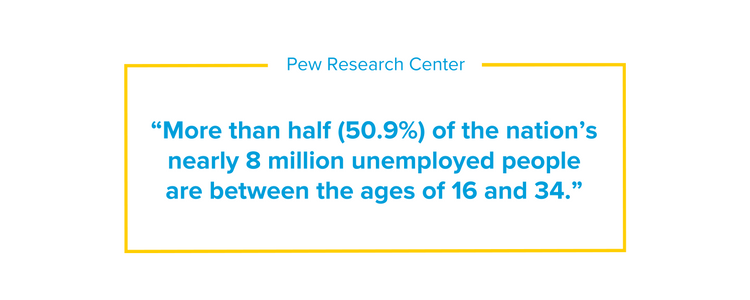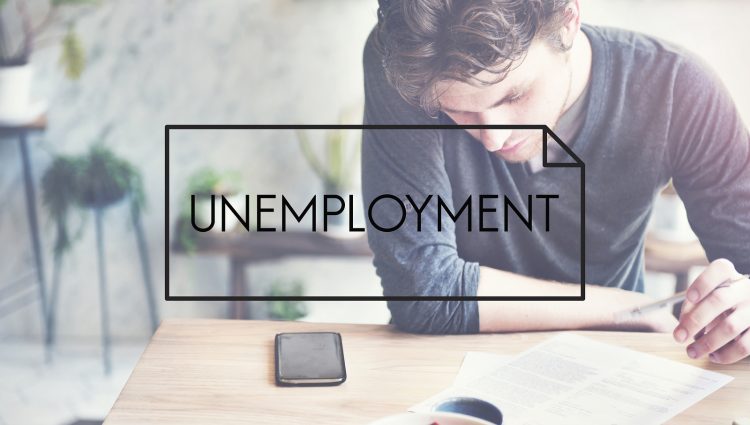When my husband, Chris, lost his job early in our marriage, I felt overwhelmed with concern about what would follow. We were in our early 20s. I was finishing my bachelor’s degree and he was largely responsible for making sure we paid our rent each month, had money for groceries, and stayed current on our student loans. I was worried about the toll his job loss would have on our financial future, but I was also unsure of how unemployment would affect his view of himself and his mental health. Would he lose confidence in himself? Would he struggle with depression?
For 20-somethings like us, the unemployment rate is higher than any other age group in the United States. In fact, more than half of unemployed individuals in this country are millennials. Chris found work again quickly, only to lose his job again earlier this year. Our student loan balance had barely changed and our expenses had risen since his first experience with unemployment. We were in our late 20s, with our third baby on the way and a mortgage payment. We spent five long months of unemployment fretting over what was next for our family.
When you’re young and unemployed, your job search has nothing to do with a bigger paycheck or moving on to a better opportunity. Instead, you are simply looking for a way to use your skills to pay your bills. In your 20s, there might also be the added pressure of student loans, car loans, or credit cards bills. In addition to the regular bills, expenses like friends getting married and having babies only stretch your budget further.
Let’s be honest, the financial burden faced by most 20-somethings is great enough without the added stress of losing your job. The pressure of finding a new one while keeping up with the demands of an already tight budget can take its toll on your mental health. And a natural loss of self-confidence and isolation that comes with being out of work only increase the negative effects these circumstances can have on your wellness. During any emotionally taxing season of life, caring for your mental health should be among your top priorities, but it isn’t always easy deciding where you should start.
 Care for your whole self
Care for your whole self
Stress can make us more vulnerable to illness or injury, even for young adults who are healthy and active. If you are dealing with the anxiety of joblessness, with bills hanging over you like a dark cloud, you can expect your body to respond to that stress with increased levels of cortisol. This hormone is a major part of how your body manages the stressors of day-to-day life. When your cortisol levels are consistently high, due to the presence of chronic stress, you may gain weight, have trouble sleeping, get sick more frequently, or struggle to maintain a positive mood. if that isn’t bad enough, you are more likely to be diagnosed with major depressive disorder, according to research by The International Society of Psychoneuroendocrinology.
A proactive approach to caring for your body, mind, and spirit is crucial to protecting mental health during times of extended unemployment. In order to combat the effects of this stressor, create a holistic health plan that addresses your physical, mental, emotional, social, and spiritual needs during unemployment as suggested by Dr. Donna L. Hamilton, corporate wellness strategist and bestselling author.
Beginning with physical wellness, strive to get adequate sleep, eat a healthy, balanced diet, and stay active throughout the duration of your unemployment. Maintain mental and emotional wellness by making a habit of meditating on affirming and positive thoughts and passages from books or scripture. Opt for uplifting forms of entertainment over negative television shows, books, or articles. Avoid isolation and support social wellness by prioritizing regular contact with close friends and family.
Finally, don’t neglect caring for your spiritual wellness. Practices such as daily journaling or spending time in quiet self-reflection can be crucial to remaining grounded during difficult seasons of life. Consider committing 15 minutes a day to meditation or prayer, using meditation guides provided by the UCLA Department of Health to add more structure to your practice. If you’re in the midst of trying to figure out your next step, consider the Ignatian approach to decision making to help you thoughtfully discern. Spending time outdoors connecting with a peaceful space may also provide you with the clarity you need to remain linked to your sense of identity during times of self-doubt.
 Don’t be afraid to reach out for support
Don’t be afraid to reach out for support
“It can be tempting to isolate yourself because you feel embarrassed or don’t want to risk being asked how the job search is going,” Hamilton said. “Have one or two people in your circle who you can call if you just want a judgment-free pep talk or who you can hang out with.”
She also suggests clearly communicating your expectations from the start as an important aspect of getting the support you need from those closest to you while you are unemployed. Let friends and family know if you prefer not to discuss your employment with them. If you are feeling particularly down and struggling with feelings of worthlessness, be honest with your most intimate friends about your need for encouraging and affirming conversations.
For Chris, time spent with friends and family helped him remain positive and upbeat, but what really changed his outlook was time spent with a resume coach refining his job search and preparing for interviews. The time they spent together gave him a renewed focus and increased confidence in his skill set.
“I felt down about myself and my capabilities,” he admitted. “It was like an identity crisis. I was wondering if what I was doing was a good fit, if I was even good enough to be in the career I was in. Being able to reassess and reevaluate what my actual strengths were and what I could bring to a company was a huge help.“
Connecting with organized support groups is another way to find encouragement during unemployment. Professor Leslie Bowman, business communications professor at the University of Maryland University College, suggests finding both online and in-person support from individuals who can empathize with your current circumstances as well as provide you with the networking opportunities that can be so beneficial to job seekers.
Online jobs boards or networking websites such as Meetup or LinkedIn are excellent avenues for building relationships with other young professionals who can offer advice for your job search, connect you with job leads, or simply empathize with your circumstances.
Bowman also suggests being aware of the temptation to spend too much time connecting online, since interpersonal connection is an essential part of avoiding the isolation that easily follows unemployment. Alumni organizations, Toastmasters groups, or TEDx Discussions can also provide you with the opportunity to make new friends and establish valuable connections with other professionals in their 20s.
Use your skill set to bolster self-confidence
“As if losing a job weren’t enough of a blow to most people’s self-confidence and morale, the inevitable rejections from job searching can add significantly to those feelings,” Bowman explained. “The best way to maintain self-confidence is to participate in activities that provide a feeling of accomplishment.”
Continue participating in hobbies and household activities that provide you with a sense of competency. Since a consistent schedule is helpful to maintaining a sense of normalcy during unemployment, continue to clean your home daily, commit to an exercise routine, attend classes or meetups at the same time each week, and make plans to spend time with the people closest to you on a regular basis. Consider volunteering in a capacity that makes use of the skill set you normally utilize in your workplace as a means of increasing your self-confidence and allowing you to sharpen your strengths or learn new skills that can aid in your job search.
Add to your resume by taking classes relevant to your current skill set, such as a coding, creative writing, or business administration. These classes will also allow you to network within your chosen work field and build relationships to supplement your social life now that you are no longer spending time with coworkers each day.
If possible, spend time pursuing freelance opportunities. For Amanda, a young professional who lost her creative writing job at 27 and subsequently spent eight months unemployed, freelance writing and editing were a big part of maintaining her sense of self.
“I started a website and writing blog,” she said. “I attempted to start a freelance editing business to get some income and stay active in my field. I was keeping my skills sharp that I intended to use for my next job. It gave me something to do so I wasn’t just sitting around all the time. It was a good filler for the resume during that time as well so I didn’t have a giant blank space.”
 Practice self-reflection and watch for signs of depression
Practice self-reflection and watch for signs of depression
It is normal to feel down or even experience situational depression when facing unemployment. Of course, if symptoms of a deeper depression begin to surface don’t be afraid to seek out professional help.
In general, it is a good idea to watch for any notable changes in your normal patterns of eating and sleeping, struggling to get out of bed in the morning, or difficulty finding enjoyment from activities that normally bring you joy, such as favorite hobbies or spending time with family and friends.
“If you start to feel hopeless or helpless, that could be more than just pessimism, especially if other symptoms like changes in sleep or appetite, or inability to feel joyful are also present,” Hamilton adds.
As part of your strategy for caring for your mental health during unemployment, set regular times to check in with yourself, taking note if any troubling changes in your mood or perception of the world of arisen. This will allow you to evaluate your own mental health and to watch for signs that point to a bigger issue that may require assistance from a professional.
“You know yourself best; if you start to feel concerned about how you’re thinking, feeling, or behaving, pay attention to that,” Hamilton encourages. “Don’t ignore it.”
If you are noticing any of the symptoms above, or if you have general concerns about your mental health, Hamilton advises beginning with a visit to your primary care physician who can suggest the appropriate counseling, medication, or lifestyle changes. Additionally, if you ever have thoughts of harming yourself or others, reach out for help right away by visiting your doctor or making a trip to the emergency room.
After graduation, it is normal to feel pressure to get your life off to solid start by building a successful career. A season of unemployment will certainly delay your plans, but it is simply an interruption, not a complete derailment of your plan for your future. The circumstances of unemployment may be beyond your control, but how you respond is not. Focusing on caring for your whole self during this stressful time in your life can make all the difference in maintaining your mental health and a healthy sense of self-confidence. Remember this time of unemployment is only temporary and continue to do the valuable work of becoming your best self, a task with indisputable personal benefits that are never wasted and are sure to shine through in interviews with potential employers.